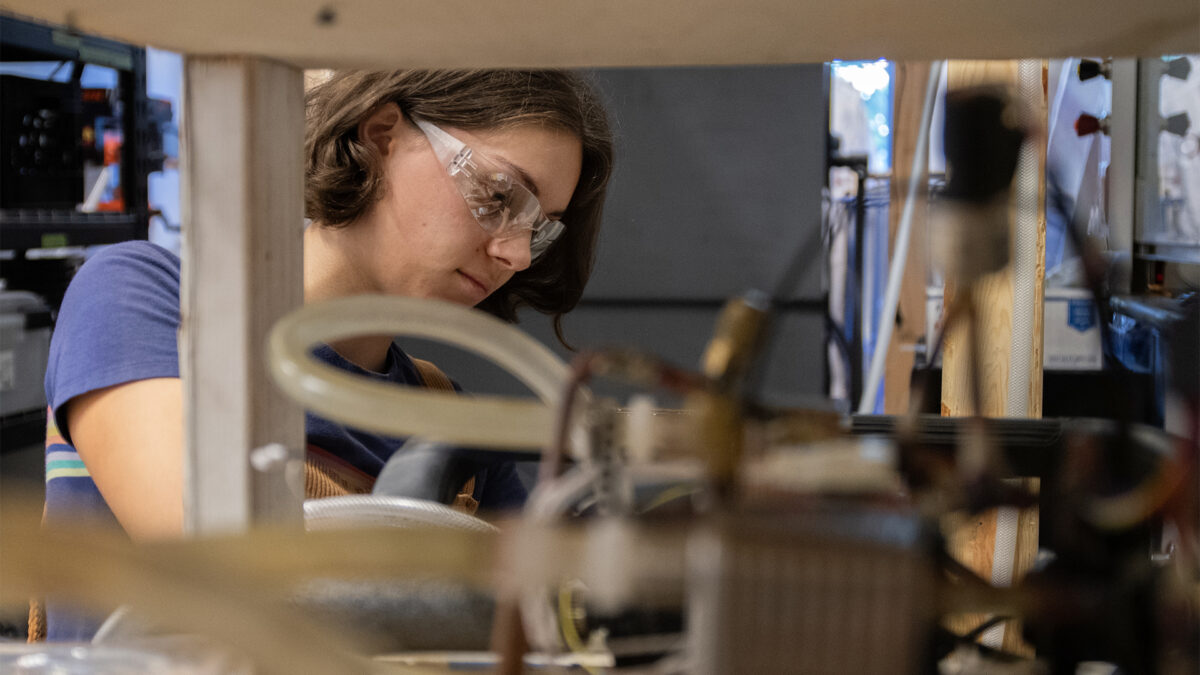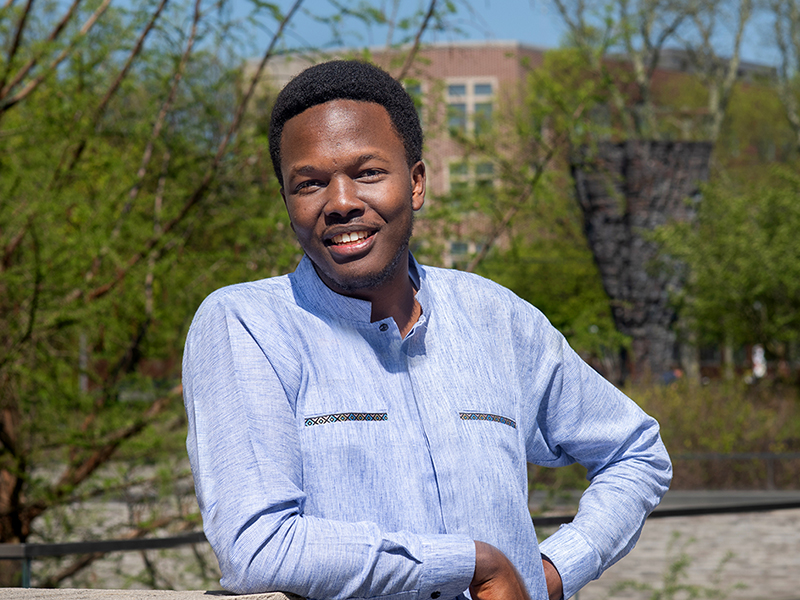Andlinger Center supports 26 internships, from power electronics to plastic-degrading enzymes

The Andlinger Center has funded 26 undergraduate students to work on 23 different energy- and environment-related internship projects. In collaboration with Princeton faculty, non-profit organizations, and governmental organizations, these interns will explore a myriad of timely topics, with projects spanning disciplines from engineering and data science to public policy and behavioral science.
The student internship program is supported by the Peter B. Lewis Fund for Student Innovation in Energy and the Environment and the Dede T. Bartlett P03 Fund for Student Research in Energy and the Environment. The program is also supported by Learning and Education in Service (LENS), a Princeton University initiative to expand access for undergraduates to summer internships in service and social impact.
The students’ projects are described below:
Internships with Princeton faculty
 Claire Deguzman (’27, CBE)
Claire Deguzman (’27, CBE)
Microbial Engineering for Energy and the Environment
Advised by José Avalos
The intern will conduct research in synthetic biology, metabolic engineering, microbiology, and/or fermentation technology to develop yeast and/or bacterial strains for the production of advanced biofuels and valuable chemicals from renewable sources. The intern will develop and deploy dynamic controls for engineered metabolism using optogenetic circuits. These controls may be applicable to yeast or bacterial species and may be used to control biosynthetic pathways for fuel or chemical production. Alternatively, they may be used to control strain growth rates with light in order to enable optogenetic control of the population composition of microbial communities engineered to produce fuel or chemical production in co-culture fermentations.
 Calvin Nguyen (’25, ECE) and Eric Chen (’25, ECE)
Calvin Nguyen (’25, ECE) and Eric Chen (’25, ECE)
Power Electronics for Piezoelectric Soft Robots
Advised by Minjie Chen
In this project, the interns will develop power electronics hardware and control for a soft robot system that makes use of the piezoelectric effect, transferring electrical energy into mechanical energy to move from point to point without requiring the use of any legs or rotary parts. The work will pave the way for future soft robotic systems capable of operating with higher energy efficiencies than existing systems.
 Anherutowa Calvo (’27, CBE)
Anherutowa Calvo (’27, CBE)
Engineering Extremely Thermophilic Cellulolytic Organisms and Enzymes for Biofuel Production
Advised by Jonathan Conway
This project will investigate the extremely thermophilic anaerobic Caldicellulosiruptor bescii and its potential applications to biofuel production. C. bescii is the most thermophilic lignocellulose-degrading bacteria known, with optimal growth temperatures between 70 and 78 °C. The intern will investigate native and engineered enzymes from C. bescii and related organisms for their ability to improve biomass saccharification. Strains of C. bescii will be engineered with altered sugar utilization to explore how diverse sugars are transported into the cell for metabolism. This will enable further work on the metabolic engineering of C. bescii for converting the released sugars into fuel and chemical products.
 Eva Reed (’26, CBE)
Eva Reed (’26, CBE)
Characterization and Optimization of Sequence-defined Liquid Crystal Phase Behavior Towards Energy-efficient Elastocaloric Response
Advised by Emily Davidson
Liquid crystals are intermediate phases between liquids and solids, encompassing myriad structures with a range of orientational and positional orders. In this project, the intern will develop processing methods to isolate and stabilize particular liquid crystal phases and subsequently employ polarized optical and X-ray scattering techniques to characterize the internal ordering in these liquid crystals. These studies will help identify and rationalize the properties of these liquid crystal oligomers, allowing further optimization of their chemical structure to enhance their elastocaloric effects. This project will enhance the potential of liquid crystal materials in solid-state refrigeration systems as a replacement for conventional energy-intensive cooling methods.
 Blake Brown (’27, COS)
Blake Brown (’27, COS)
Disordered Hyperuniform Meta-surfaces for Radiative Cooling
Advised by Claire Gmachl
Disordered hyperuniform (DHU) structures are patterns that are able to create photonic band gaps (highly reflective spectral regions) that are isotropic in space. The latter property makes the DHU structures interesting for thermal radiation and related applications such as radiative cooling. In this project, the intern will assist in researching the radiative cooling potential of DHU meta-surfaces, followed by providing support for modeling, fabrication, and testing efforts.
 Chirayu Nimonkar (’26, COS) and Andrew Yang (’26, ORF)
Chirayu Nimonkar (’26, COS) and Andrew Yang (’26, ORF)
Applying Data Science to Model Realistic Net-zero Infrastructure Deployment Pathways
Advised by Chris Greig
This project applies computer science, machine learning, and AI to build tools that can bridge theoretical net-zero scenarios with real-world infrastructure deployment characteristics. Working with experienced engineers and harvesting real-world datasets, the interns will develop algorithms and models to reflect investment decision behaviors, infrastructure development and construction sequences, and cross-sector dependencies. The research aims to provide climate policy and investment planning tools for government and industry. Ultimately, the project has the potential to impact decision-making that guides the pathway to decarbonization in the U.S. and directs hundreds of billions of dollars in investments.
 Hennessy Soto (’27, MAE)
Hennessy Soto (’27, MAE)
Tailoring Materials for Electrochemical Separations
Advised by Kelsey Hatzell
Traditionally, separations for water treatment-based processes are accomplished by utilizing pressure- or temperature-based driving forces (membranes and distillation). While effective, treatment technologies that do not operate at ambient conditions can be energy-intensive and lack discrimination between value-added products and waste products. In these instances, electrochemically driven separations are ideal, as they are easy to integrate with portable power supplies. There are two emerging interests in electrochemical separations: 1) electrochemical double layer-based bulk separations, and 2) redox-based selective separations. In this project, the intern will tailor the interfacial properties of novel, pseudocapacitive materials to selectively separate valuable metals from multi-component waste streams.
 Abigail (Abbie) Cheng (’27, CEE)
Abigail (Abbie) Cheng (’27, CEE)
Estimate Impacts of EPA Greenhouse Gas Standards on Power Plants on Retail Electricity Prices
Advised by Jesse Jenkins
In May 2023, the Environmental Protection Agency (EPA) proposed new regulations to address greenhouse gas emissions from fossil fuel-fired electric generating units. Two emission control technologies — carbon capture and storage and hydrogen turbines — are provided in the guidelines for both new and existing fossil fuel-fired electric generating units to achieve ambitious greenhouse gas emission reductions. The intern will support research to evaluate the impacts of the proposed greenhouse gas regulations on the power system. The objective of this project is to 1) estimate how retail electricity prices would be impacted by the proposed regulations and compare outcomes with several alternative greenhouse gas mitigation strategies; and 2) develop a toolkit for the open-source capacity expansion model, GenX, to estimate the actual impact of modeled results on retail prices, accounting for differences between competitive markets and cost of service markets.
 Arjun Shetty (’27, MAE)
Arjun Shetty (’27, MAE)
Ammonia Combustion for Power Generation
Advised by Yiguang Ju
Ammonia is considered a promising hydrogen carrier for power generation because it has a high energy density and is simple to transport and store. However, burning ammonia as a fuel can generate NOx air pollution and N2O greenhouse gas emissions, which could counteract ammonia’s promise as a carbon-free energy carrier. This project will develop a novel high-pressure, premixed ammonia combustor using a jet-stirred reactor to reduce NOx and N2O emissions and enable ammonia power generation using gas turbine engines. The intern will support the design of the combustor and conduct experimental measurements during ammonia combustion to measure emissions from the process.
 Kaya Unalmis (’25, ECE)
Kaya Unalmis (’25, ECE)
Optimizing Fusion Reactors with a Data-based Approach
Advised by Egemen Kolemen
One of the leading fusion reactor designs is a stellarator, which resembles a twisted, 3-D torus that uses magnetic fields to confine plasmas. To create commercially viable fusion power, stellarators must be capable of confining plasma long enough for fusion reactions to occur while meeting other physics, design, and cost requirements. The Plasma Control Group has developed a stellarator equilibrium and optimization code known as DESC to create a database of over 100,000 possible stellarator designs. The intern will apply statistical and/or machine learning techniques to analyze this large database with the aim of discovering more optimal fusion reactor designs.
 Luc Harbers (’25, MAE) and David Wang (’27, MAE)
Luc Harbers (’25, MAE) and David Wang (’27, MAE)
Delving into Liquid Metal Research, Design, and Development
Advised by Egemen Kolemen
Liquid metals show promise for their potential to handle heat loads in nuclear fusion applications. The Plasma Control Group is working on the Liquid Metal eXperiment Upgrade (LMX-U), a liquid metal loop device capable of free-surface liquid metal flow within a magnetic field. The working fluid of LMX-U is Galinstan (an alloy of gallium, indium, and tin), a liquid metal at room temperature. The interns will design upgrades and assist in the experiments on the LMX-U. Specific projects may include utilizing diagnostics such as Ultrasound Doppler Velocimetry to measure velocities within the flow and assisting with liquid metal experiments and 3-D fluid simulations.
 Vibha Srinivasan (’26, ECE)
Vibha Srinivasan (’26, ECE)
Speeding up the Energy Transition: What Is the Capacity of Current Domestic and International Clean Energy Supply Chains, and How Do We Ramp Up?
Advised by Eric Larson
The deep decarbonization of society requires rapid expansion of clean energy supply chains and the deployment of clean energy technology capacity across the globe. However, various bottlenecks, constraints, and barriers act to limit the speed of the energy transition, both domestically and internationally. These roadblocks threaten to jeopardize the achievement of global net-zero emissions goals. The intern will examine the supply chain needs of the energy transition and identify solutions for speeding up the availability of critical energy technologies and resources.
 Jessica Wang (’27, CBE)
Jessica Wang (’27, CBE)
Engineering of Thermostable Plastic Degrading Enzymes
Advised by A. James Link
Polyethylene terephthalate, also known as PET, is one of the most commonly used plastics in consumer products, from water bottles to clothing fibers. Despite being produced in large amounts, however, very little PET is actually recycled. In this project, the intern will focus on the discovery and engineering of a class of enzymes, known as PETases, that can break down PET polymers into their monomer building blocks. The enzymes developed in this project could be deployed in processes to more effectively recycle PET, preventing it from ending up in landfills and the ocean.
 Ariane Adcroft (’26, MAE)
Ariane Adcroft (’26, MAE)
Experimental Cooling Systems and Materials Research
Advised by Forrest Meggers
This project involves a multidisciplinary effort to demonstrate the potential of new cooling technologies, with a focus on using materials science to enhance the capabilities and performance of radiant heat transfer in building systems and components. The intern will learn about radiant heating and cooling systems, which have the potential to significantly cut energy consumption in buildings in comparison to conventional air-based HVAC systems. The intern will help to build experimental models and prototypes of radiant cooling panels as well as the underlying heat pump systems that drive them.
 Maia Abiani (’26, MAE)
Maia Abiani (’26, MAE)
Evaluating Ammonia Combustion Concepts
Advised by Michael Mueller
Ammonia is a zero-carbon alternative fuel that is more easily transported than hydrogen. However, the combustion of ammonia can lead to harmful emissions of nitrogen oxides and nitrous oxide. In this project, the intern will utilize a computational modeling framework to evaluate new ammonia combustion concepts and understand the potential for reducing nitrogen oxides and nitrous oxide emissions during combustion.
 Rebecca Chleboski (’26, ECE)
Rebecca Chleboski (’26, ECE)
Stacked Organic/Inorganic Hole Transport Layers for Halide Perovskite Solar Cells
Advised by Barry Rand
Researchers studying halide perovskite solar cells have made great strides to boost their power conversion efficiencies, yet many challenges related to device stability remain to be resolved before perovskite solar modules can achieve widespread commercialization. One such challenge is related to the mobility of iodine, the halide commonly used in metal-halide perovskites. This project will explore the fabrication and testing of nanolaminate organic/inorganic semiconductor hole transport layers that could be used to convey electrical charge while blocking iodine transport. The intern will make and test these thin film layers in solar cells to determine their potential effectiveness at solving a key stability challenge facing halide perovskites.
 Vishva Ilavelan (’26, COS)
Vishva Ilavelan (’26, COS)
Large Language Model Applications for Environment, Sustainability, and Energy
Advised by Z. Jason Ren
An immense amount of information is required to solve contemporary environmental problems in the context of ever-changing natural conditions. However, the presence of limited data for many hard-to-measure variables has hindered the implementation of AI to better understand emerging research topics in environmental science and engineering. In this project, the intern will apply large language models to environmental and sustainability challenges. They will develop and fine-tune a large language model capable of answering domain-specific questions and informing research investigations related to topics such as decarbonization, resource recovery, and the management of emerging contaminants.
 Carson Repins (’27, CBE)
Carson Repins (’27, CBE)
Toward Efficient Bifunctional Catalysts for Sustainable Fuel Production
Advised by Michele Sarazen
Zeolites are an important class of solid acid catalysts whose thermal stability, diverse range of pore sizes, and tunable acid sites make them applicable to a wide range of catalytic applications, including natural gas upgrading to liquid products and waste plastic upcycling to fuels and monomers. These applications utilize zeolites as supports for metal nanoparticles, which perform additional chemistry such as oxidation and/or dehydrogenation in tandem with zeolitic acid catalysis to achieve the desired overall chemical transformations. This project will focus on hydrothermal syntheses of zeolite-encapsulated metal nanoparticle catalysts for use in plastic upcycling and/or methane partial oxidation chemistries. The intern will evaluate the catalytic consequences of varying the acid strength, altering the metal incorporation method, and modulating the presence of meso/macropores.
 Aaron Dantzler (’25, ORF)
Aaron Dantzler (’25, ORF)
Impact on Daily Electricity Grid Operations of Carbon Pricing
Advised by Ronnie Sircar
Until we achieve large-scale, efficient battery storage adoption, the intermittency of many renewable energy sources will result in day-to-day consequences. For example, running reserves to protect a grid operation from load shedding and blackouts, caused in part by actual renewable production underperforming forecasts, requires running thermal power plants and carbon-intensive peaker plants, resulting in both financial and environmental costs. In this project, the intern will study the design and subsequent impact of a carbon price to re-inform the deployment of grid resources, incorporating the objective of minimizing emissions into existing grid operation and management.
Internships with Non-Profit and Government Organizations
 Ava Fonss (’27, ORF)
Ava Fonss (’27, ORF)
Residential Electrification
American Council for an Energy Efficient Economy (ACEEE)
Converting residential buildings from using fossil fuels to using efficient electric alternatives is a critical step for mitigating climate change, and individual decision-making, whether by homeowners or multifamily building owners, is important to understand to encourage this conversion. The ACEEE Behavior, Health, and Human Dimensions Program conducts research on energy efficiency from a behavioral perspective. The intern will conduct background literature reviews and preliminary interviews to inform guides for state energy offices on how they can use behavioral science to encourage climate-friendly decision-making.
Joe Wahba (’26, SPI)
Western Electricity Markets
Environmental Defense Fund (EDF)
The intern will support EDF’s engagements in fostering an energy market in the western United States, providing support for technical, policy, and economic analyses. In addition to providing general assistance for the west-wide governance pathways initiative, the intern will support and have direct input into work including research on electricity market structures and how to import best practices to the western electricity market, working with a diverse set of public interest stakeholders, and conducting quantitative emissions and affordability research.
 Christina Li (’26, ORF)
Christina Li (’26, ORF)
Federal Energy Regulatory Commission
Office of Energy Market Regulation
The FERC Office of Energy Market Regulation regulates interstate sales and transmission of electricity and promotes strong national energy infrastructure, including adequate transmission facilities. In this role, the intern will learn about the fundamentals of wholesale electricity markets from FERC experts, participate in interdisciplinary teams analyzing regulatory filings, and work with a mentor to define an independent research project at the intersection of engineering, economics, and policy. At the conclusion of the internship, the intern will present their research findings to the Office of Energy Market Regulation’s senior leadership.
 Ashley Holmes (’26, CEE)
Ashley Holmes (’26, CEE)
Drinking Water and Wastewater Utilities
Moonshot Missions
Moonshot Missions is currently working on topics related to environmental equity, such as drinking water and wastewater operational optimization and affordability, to provide access to clean water in communities across the United States. The intern will work as a technical resource for the organization to support the research team. The intern will apply research and knowledge to address the challenges facing drinking water and wastewater utilities, particularly in economically distressed communities.


